Technology Adoption of Blockchain for Supply Chain Transparency
Blockchain technology is generating a big stir in logistics and supply chain management. This particular technology received initial attention for its capability to create a trusted and transparent ledger of transaction information. The arrival of this technology is timely because consumers are demanding supply chain transparency. Before any companies can reap the benefits of this exciting new blockchain technology, they must be thoughtful about where to apply it and how to overcome a few key stumbling blocks.
Implementing blockchain technology can help participants to record price, date, location, quality, certification, and other relevant information to effectively manage the supply chain. The availability of this information within blockchain can increase traceability of material supply chain, lower losses from counterfeit and gray market, improve visibility and compliance over outsourced contract manufacturing, and potentially enhance an organization’s position as a leader in responsible manufacturing.
In this article, we will take a closer look in supply chain deployments of some companies around the world, and in the United States in particular to find out how it helps to creat the transparency between companies.
#1: IBM Blockchain
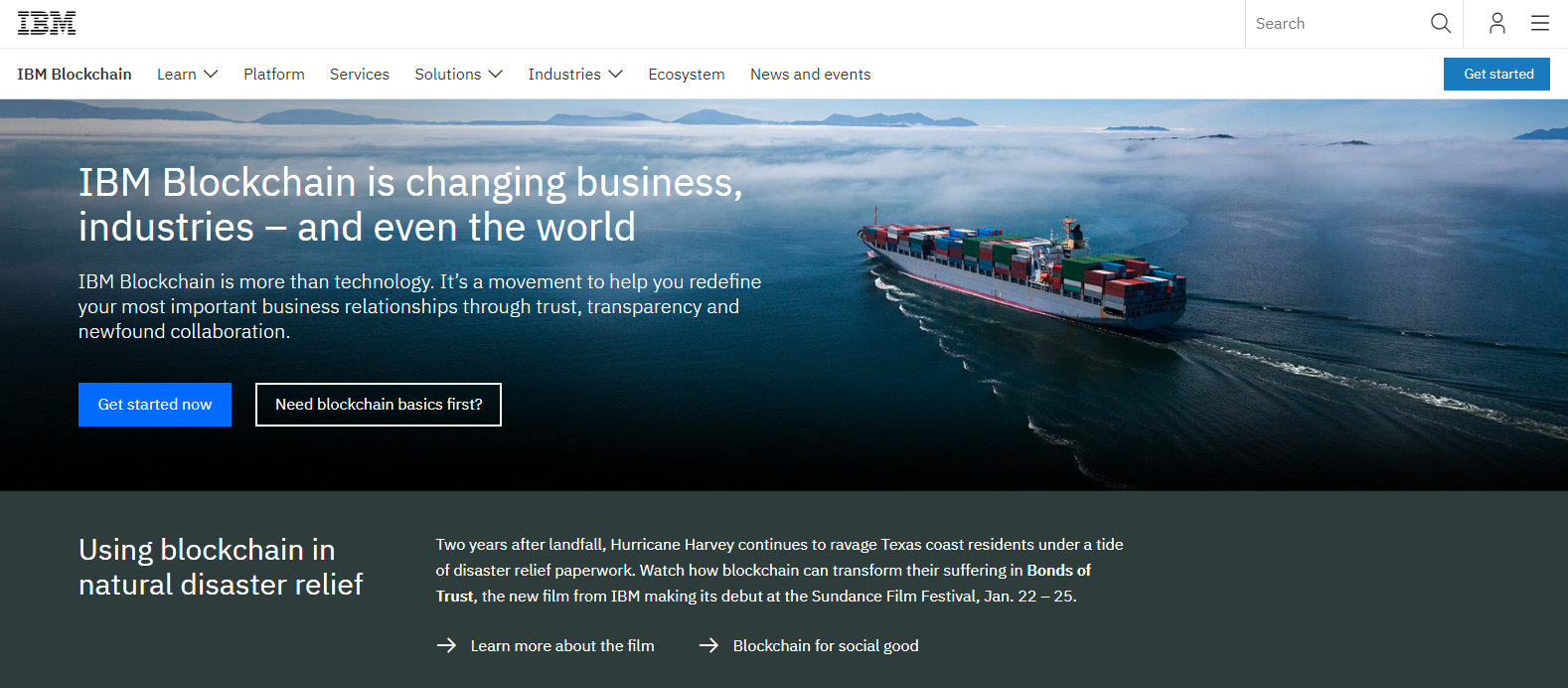
IBM Blockchain is changing business, industries – and even the world. This company is betting heavily on blockchain technology revolutionizing everything from shipping to banking. IBM identified three areas where blockchain could be valuable: Financial services, shipping and healthcare. It’s a movement to help you redefine your most important business relationships through trust, transparency and newfound collaboration.
Jerry Cuomo, VP of blockchain technology at IBM,says his company is offering a set of cloud services to help customers create, deploy and manage blockchain networks. This fits in with IBM’s broader strategy to offer a wide range of cloud services to its customers.
Although the blockchain piece is based on the open source Hyperledger Fabric project of which IBM is a participating member, it has added a set of security services to make it more palatable for enterprise customers, while offering it as a cloud service helps simplify a complex set of technologies, making it more accessible than trying to do this alone in a private datacenter.
Transform supply chain transparency with IBM Blockchain
From raw materials to distribution to after-sale support, understanding the location and flow of products within your supply chain is critical — and not only for maximizing efficiency. Today’s consumers demand transparency on where and how products are made. Regulators around the world also require information about supply chains — with penalties for noncompliance.
Beyond the need for information, complex supply chains depend on trust to function properly. But distrust between organizations has historically discouraged them from sharing or relying on shared data. IBM Blockchain can remedy that with a shared, permissioned record of ownership, location and movement of parts and goods. That shared record can increase efficiency, transparency and trust for any business.
#2: TradeLens – platform developed by IBM and Maersk GTD.
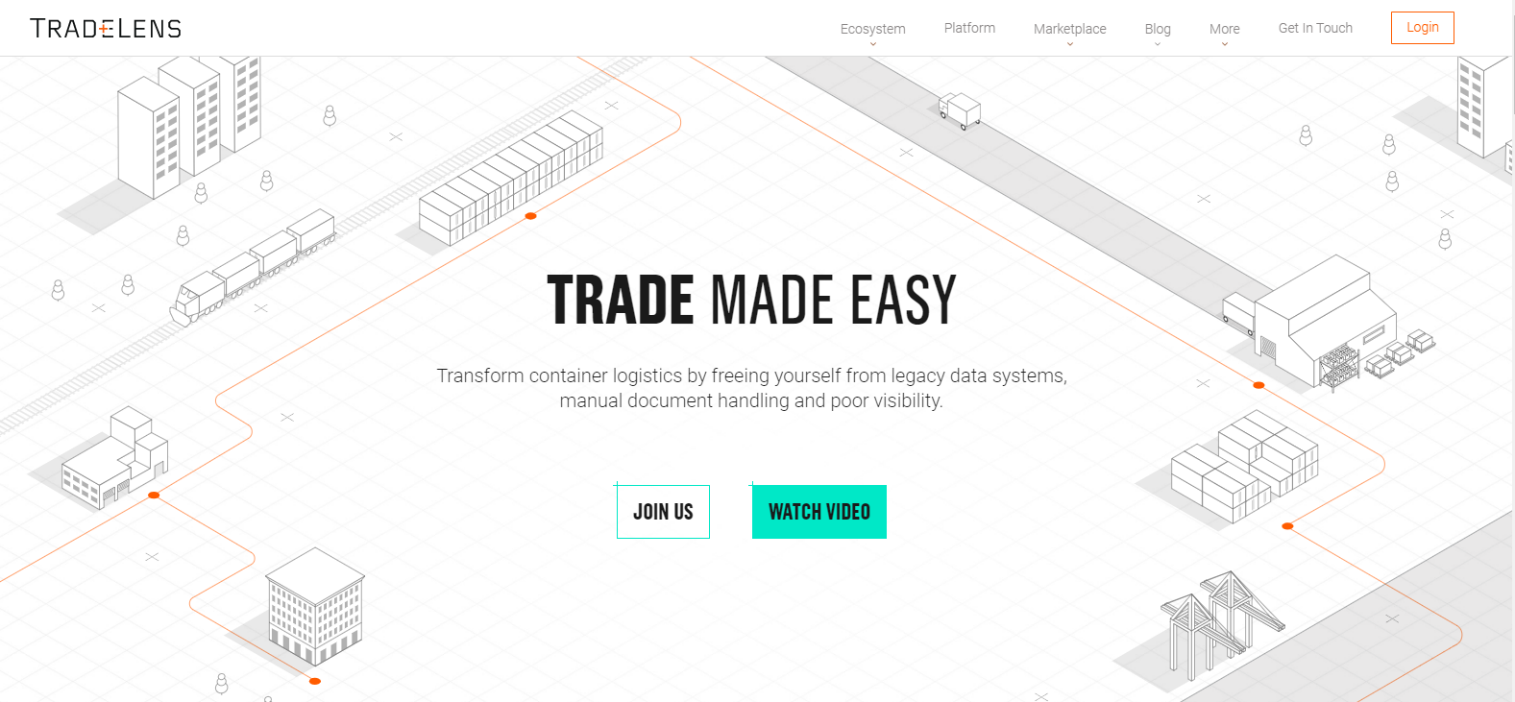
At THINK ’18 in San Fransisco, IBM and Maersk announce the intention to form a business collaboration to build a digital platform in concert with the shipping industry. Together each partner works to ensure the product and business model is aligned to meeting the needs of the shippers and supply chain operators around the world.
TradeLens is an open and neutral solution underpinned by blockchain technology. By digitizing supply chains, we are enabling increased industry innovation. TradeLens aims to improve shipping by minimizing paperwork and the documentation errors that often accompany it. More than 150 million transactions have already been logged on its blockchain. To date, more than 4,000 shipping containers are being tracked, with plans to add more.
The platform of TradeLends promotes the efficient, transparent and secure exchange of information in order to foster greater collaboration and trust across the global supply chain. This company uses open standards, open governance and open APIs to ensure the entire industry can benefit and drive continued innovation, while at the same time providing much-needed security and data privacy. TradeLens brings together ocean carriers, port and terminal operators, inland transportation providers, customs authorities, cargo owners and freight forwarders. As TradeLens grows, the benefit to all grows through greater visibility, consistent information, better collaboration and shared insights.
TradeLens is designed for security and data privacy, which are essential to the success of a business network that includes not just partners, but competitors. TradeLens uses IBM Blockchain technology to give trading partners a shared view of transactions without compromising details, privacy or confidentiality. Consistency checks indicate that documents have been verified and not altered, providing an immutable record of transactions.
How It Works
On TradeLens, ocean carriers can operate independent blockchain nodes for data sharing related to their contracted consignments. Access controls let data owners prescriptively determine different levels of permission for data access. Data owners continue to control their data even after it becomes part of the blockchain network.
Two of the top ocean cargo carriers, CMA CGM and MSC Mediterranean Shipping Company will operate their own blockchain nodes, host data and serve as Trust Anchors, or validators, for the network. Both companies will join the TradeLens Advisory Board, which will include other members to help guide future development and advise on standards. The participation of these additional carriers in our open governance is another proof point of our blockchain principles in action.
Equally important, the momentum of TradeLens is the latest proof point of the growing adoption of blockchain, which is increasingly used in banking, food safety, supply chain and other industries where trading systems must be digitized. Blockchain skeptics now have something new to think about in terms of the global reach and scalability of the TradeLens platform, which is tracking more than 10 million events per week and growing fast.
#3: Omnichains
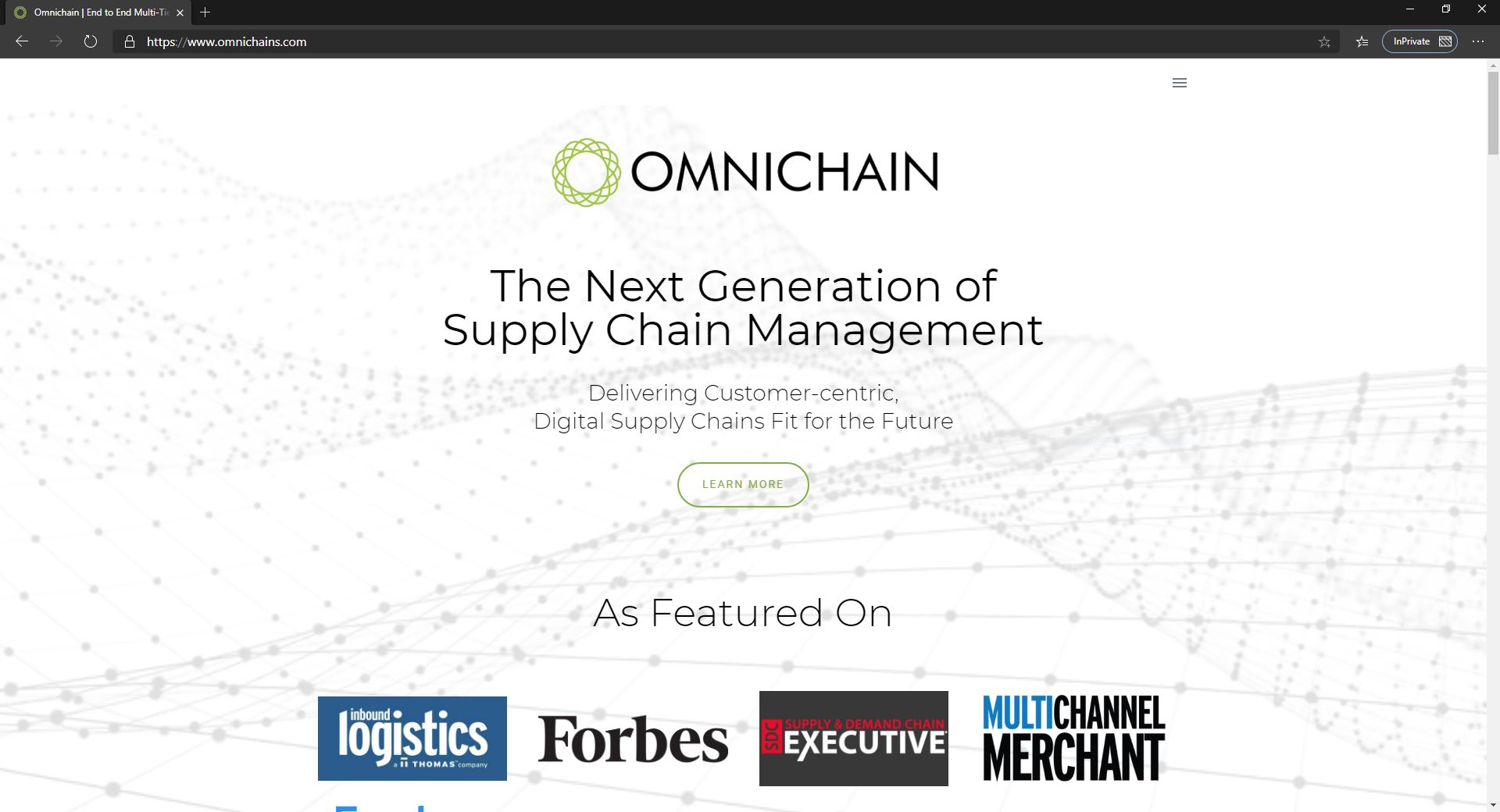
Co-founded by global supply chain expert Pratik Soni and software innovator Ray Young in 2018, Los Angeles-based Omnichain Solutions (Omnichain) provides and implements intelligent, end-to-end supply chain technology solutions.
Pratik Soni, co-founder and CEO, Omnichain, said, “Most companies today manage their online and offline channels as separate entities with their own unique systems. This inherent disconnect creates a ripple of challenges in balancing online and offline demand, as well as in inventory management and driving business growth. Blockchain can tap into disparate systems and tie everything together, enabling companies to align their online and offline channels as one. They can thus always meet consumer demand and capture sales with goods available where they are wanted most—whether online or in store.”
How It Works
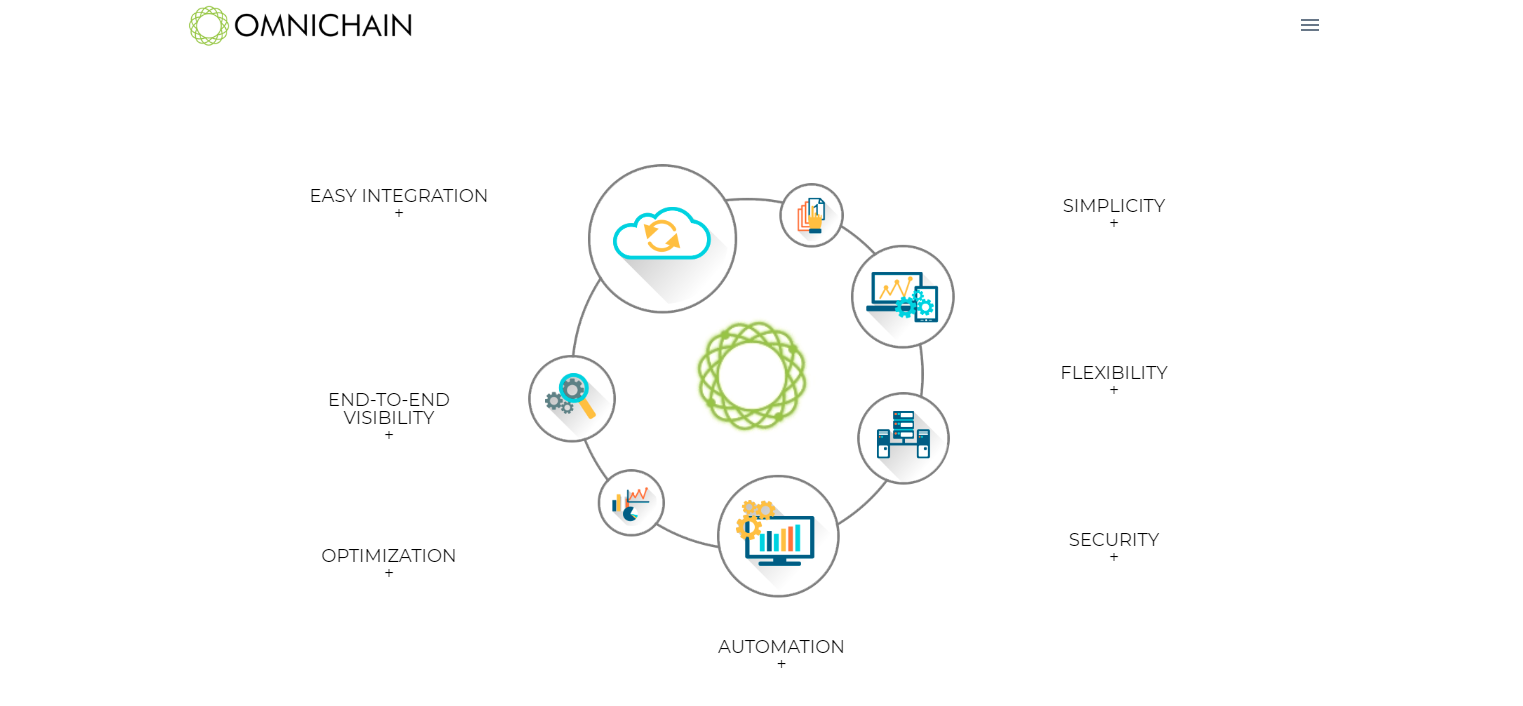
Omnichains – one single cloud-based environment built around a unified data set which fully integrates all supply chain business processes wherever they occur. It covers all supply chain processes, whether they begin and end entirely within a manufacturer’s manufacturing plant or warehouse, or solely within the facilities of one or more of the manufacturer’s partners, or are initiated in one location and complete in another locale. The omnichain brings all those processes together and enables data gathered by those processes to flow freely across the entire environment. In the omnichain, everyone at the manufacturer or its partners who is a stakeholder in one or more supply chain process will have access to all the relevant data in real-time which they need for their role within the entire supply chain.
Its demand-driven, Software-as-a-Service (SaaS) platform delivers real-time transparency, trust and efficiency from source to shelf using Blockchain technology. The holistic platform simplifies omnichannel forecasting and replenishment, optimizes manufacturing planning, eliminates lost sales, and reduces inventory carrying costs, while driving supply chain transparency, accuracy and accountability.
#4: CargoX
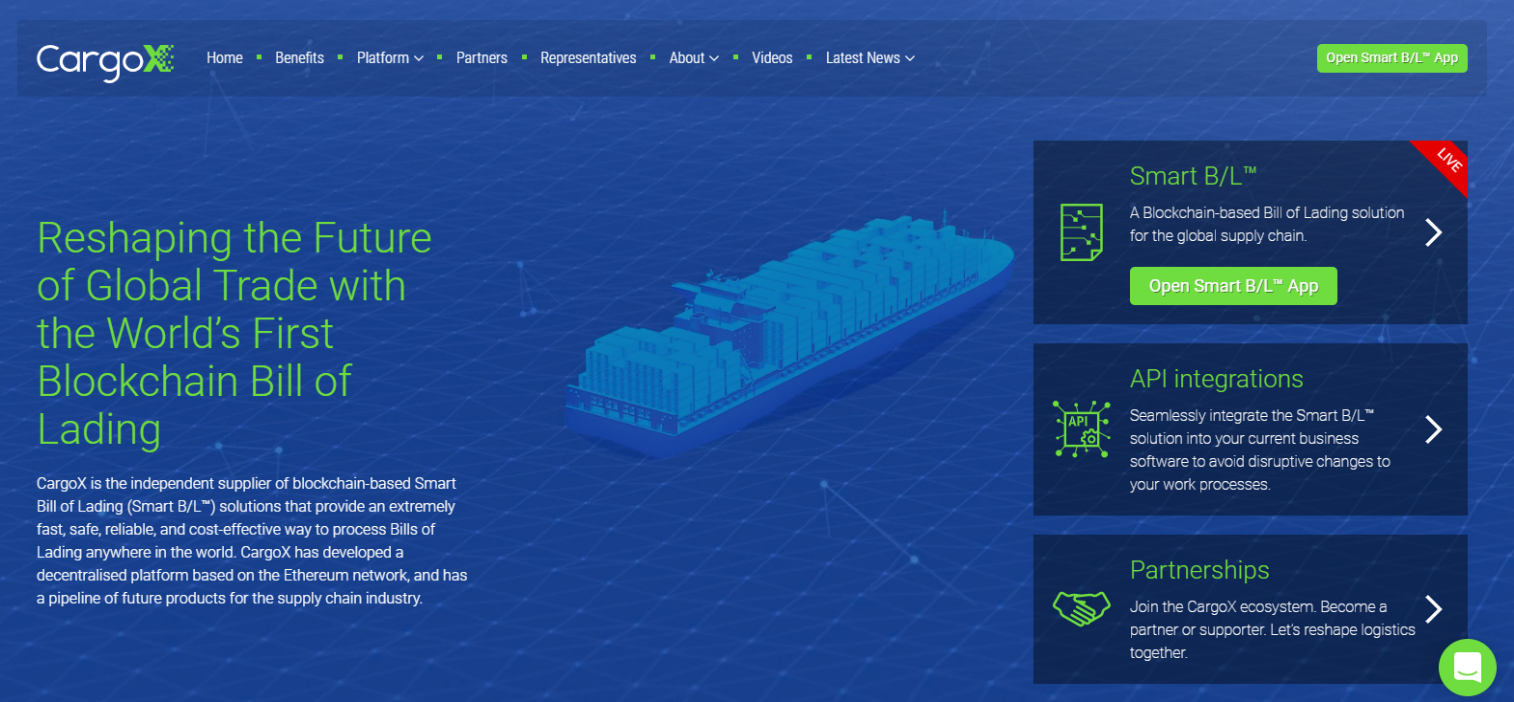
The CargoX platform is built with the revolutionary Blockchain Document Transaction System technology (BDTS) – an online system based on blockchain technology that is intended for creating, tracking, managing, storing, and transferring the ownership of documents.
This platform developed for secure, fast, and efficient maritime shipping documentation creation, transfer and management. Up-front investments are negligible, and the benefits will help you maximize operational profits in real-time! Shipping, and logistics or the supply chain as an industry, have been fed up with this approach for a long time – but there was simply no solution. Until CargoX presented its Smart B/L ™ solution. The Smart B/L™ blockchain bill of lading solution required CargoX to develop a solid framework, which serves as a platform for new CargoX solutions that will be introduced in the future, according to the set roadmap
How It Works
The Blockchain Document Transaction System (BDTS) has emerged as the underlying technology driving services that power a wealth industries and environments, and they all have one thing in common – it is absolutely crucial to be able to always uniquely and irrefutably define who the owner of specific data or a document is. It is also a requirement that the document can be previewed, viewed, transacted, owned, and archived as deemed necessary for a specific process.
CargoX has already launched the first open blockchain platform for the logistics and supply chain industry, where the Smart B/L™ is just the first of the solutions to be offered, built with the CargoX BDTS technology.
#5: Ripe.io
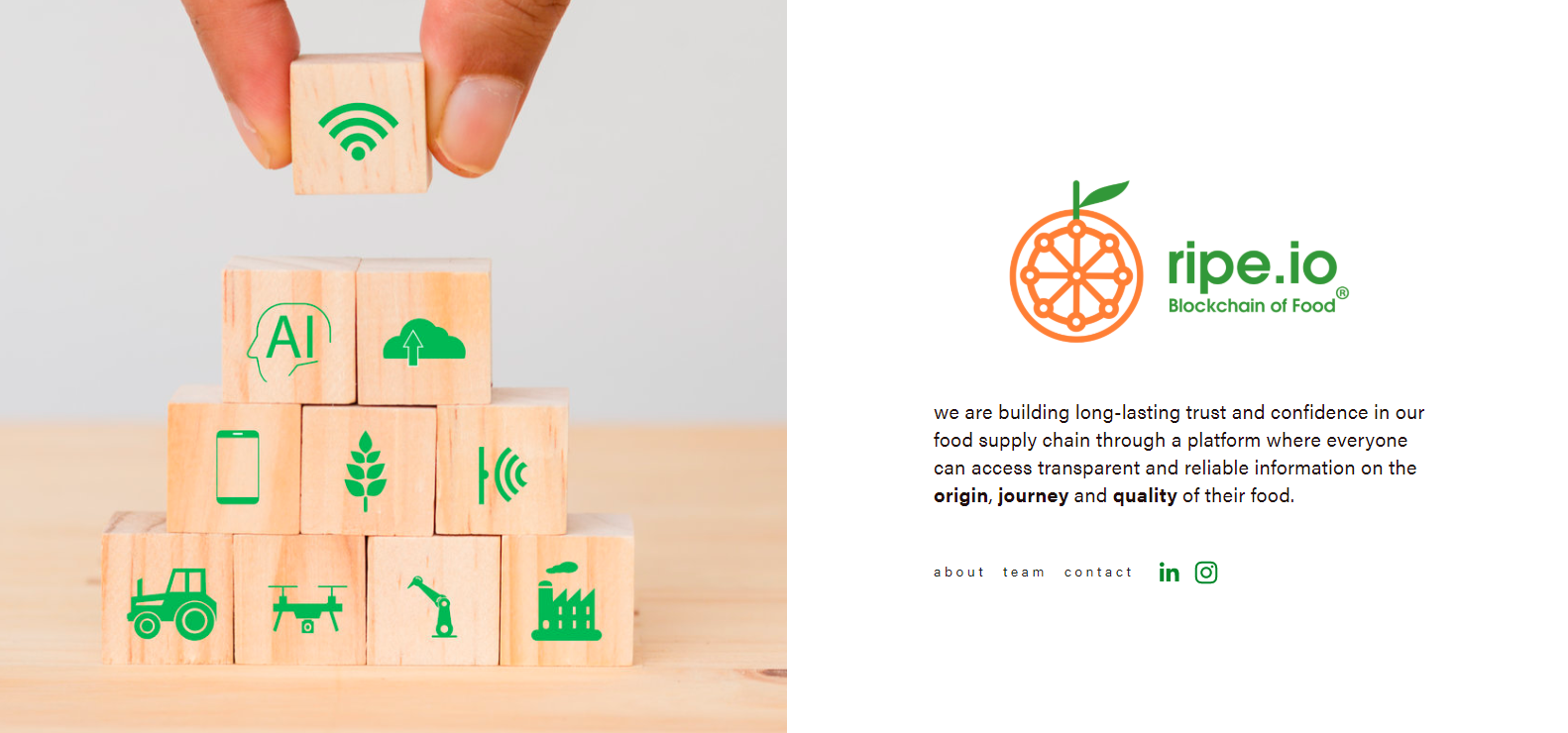
Ripe.io is one of the world’s leading thought leaders on the front lines of the intersections between blockchain and agriculture.
Ripe.io are building long-lasting trust and confidence in our food supply chain through a platform where everyone can access transparent and reliable information on the origin, journey and quality of their food. Ripe Technology is on a mission to build long-lasting trust and confidence in our food supply chain through a platform where everyone will be able to access transparent and reliable information on the origin, the journey and quality of their food. With funding support from both Maersk Ventures and Relish Works, ripe.io has offices in both San Francisco and New York City.
In 2019, R3, a global enterprise blockchain software firm and Ripe Technology (ripe.io), the innovative startup bringing blockchain to the food industry, are joining forces to improve transparency and trust in food and agriculture supply chains through the digitization and enterprise adoption of blockchain.
How It Works
Arcording to Phil Harris, President and Co-Founder of ripe.io, they work with a number of customer segments including, but not limited to, farmers, processors, distributors, CPGs, grocery/retail and large industry associations. They focus on a number of areas across these segments.
Reducing food waste: By tracking and tracing food items in real time, supply chain participants are alerted of in-congruencies and can manage food safety, inventory and freshness to prevent food waste. ripe.io’s solution allows users to detect and communicate inefficiencies in fresh products and certify the information holds true on the blockchain system.
Sustainability: Customers want information beyond the physical food product. Visibility into organic certification, animal welfare practices, soil quality, etc. backed by a blockchain ledger help assure consumers the information provided holds true and aligns with sustainability values. It also holds the industry accountable for more ethical and sustainable practices that provide a better future for generations to come.
Locality: Consumers want more validation on the origin of the food they’re consuming. Due to disconnected communication systems, food supply chain stakeholders have challenges providing this information. Through ripe.io’), consumers are able to track the granular details of the origin of their food products and better support local agriculture. This also helps mollify the rural-urban divide by generating rural economies and connecting our communities through food.
The Bottom Lines
The transparency that blockchain enables can go far in building trust among companies, their partners, and their ultimate customers. As supply chains become more complex and consumers demand sustainable products, blockchain also offers the potential to increase traceability of products, reduce the risk of fraud, and connect consumers to the back stories of the goods they purchase. It is clear that those who are able to harness this blockchain technology can make the next great leap in innovation and transparency.
Blockchains are, potentially, a disruptive technology for the design, organization, operations, and general management of supply chains. Blockchain’s ability to guarantee the reliability, traceability, and authenticity of information, along with smart contractual relationships for a trustless environment all portend a major rethinking of supply chains and supply chain management. In this section, we will dive deeper into the value proposition of blockchain technology and its applicability to goods and manufacturing supply chain, its structure, and possible new components for managing a supply chain.









